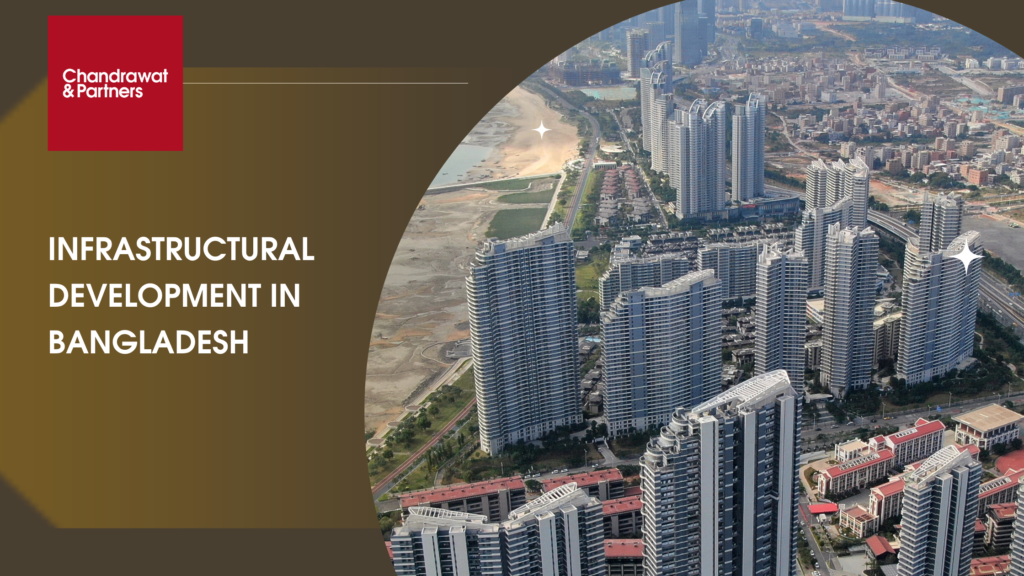
Jun 26, 2024
INFRASTRUCTURAL DEVELOPMENT IN BANGLADESH
PREFACE
Infrastructure, in general, is defined as a set of facilities by which goods and services are provided to the public. Infrastructural development is considered as one of the most important pillars of economic progress. Over the past ten years, Bangladesh has experienced rapid economic growth. Competent export industries, especially in the textile sector, and remittances from immigrants supported the country’s economic expansion. The country is providing beneficial infrastructural opportunity as the economy is showing positive signs of growth.
NEED FOR INFRASTRUCTURE AND ECONOMIC CONTEXT
Bangladesh has been showing consistent growth with a GDP growth rate of 6-7% since 2023. The current economic boom has accelerated infrastructure building in order to support future growth. The present infrastructure of the country needs a big overhaul in order to lure the potential investors and attract Foreign Direct Investment (“FDIs”). Modernised urban infrastructure, stable power supplies, and efficient transport networks are essential for easing company operations, bringing more foreign investment and enriching the quality of life.
INITIATIVES TAKEN BY THE GOVERNMENT
The Bangladesh’s government has started a number of large-scale projects after considering state’s domestic needs. Bangladesh can become a developed country according to Vision 2041 Plan. By providing good incentives for investors, the government’s policy framework promotes private sector involvement through Public-Private Partnerships (“PPPs”).
ESSENTIAL AREAS FOR INVESTMENT:
- Transportation Infrastructure: A key component of economic growth is transportation infrastructure. The government of Bangladesh has given top priority to the development and upgradation of port, rail, and road infrastructure. Initiatives such as the Padma Bridge, which links the capital with the southwest Dhaka, are game-changers. This bridge is expected to boost regional connectivity and economic integration. Investors can find opportunities in highway construction, maintenance, and toll road operations.
- Railways: There are numerous projects underway in Bangladesh to modernise and expand the country’s existing railway network. The capital’s urban mobility will be completely transformed by the Dhaka Metro Rail project. In order to improve regional trade, efforts are underway to build transnational railway linkages with nearby nations.
- Ports and Maritime: Bangladesh is a major participant in maritime trade due to its advantageous location along the Bay of Bengal. Important projects include the growth of Chittagong Port and the development of the Payra Deep Sea Port. These ports will decrease traffic and turnaround times in addition to increasing cargo handling capacity. There are plenty of investment prospects in port management, construction, and auxiliary services.
- Energy Infrastructure: As industry grows, it needs a reliable and sustainable source of energy. Bangladesh has been moving forward with its energy source diversification. One such method is to increase the power generating capacity nuclear power, renewable energy sources, and conventional fossil fuels is the government’s main priority. The Rooppur Nuclear electricity plant is a historic project that will greatly increase the nation’s electricity supply. Building power plants, energy storage technologies, and renewable energy initiatives (wind, solar) present a wealth of investment prospects. Lucrative investment opportunities are presented by initiatives focused on expanding rural electrification, introducing smart grid technology, and updating the grid infrastructure.
URBAN DEVELOPMENT:
Sustainable urban development can be achieved in Bangladesh by:-
- Real estate and housing: There is a huge market for high-quality, reasonably priced real estate. Development of real estate, especially in cities, yields large profits. There is a strong demand for projects that concentrate on mixed-use developments, residential complexes, and commercial structures.
- Ensuring Adequate Water Supply and Sanitation: It is vital to guarantee that everyone has access to clean water and adequate sanitation. The government is investing in waste management facilities, sewage systems, and water treatment plants with funding from foreign contributors. PPP initiatives that enhance urban water supply and sanitation services are open to investors.
A FAVOURABLE INVESTMENT CLIMATE:
Bangladesh offers a favourable investment climate for the development of its infrastructure due to:-
- Economic Advantage: To attract the FDI, the government provides several advantages, such as tax holidays, duty-free machinery imports, and profit repatriation. The establishment of Special Economic Zones (SEZs) aims to offer fiscal, regulatory, and infrastructure benefits to investors.
- Political Stability and Policy Support: Long-term investments require political stability. Investors are offered a safe and business-friendly environment by the government’s proactive attitude towards infrastructure development and its readiness to collaborate with the private sector through PPPs.
- Strategic Location and Trade Possibilities: Bangladesh is perfectly situated as a regional hub at the intersection of South and Southeast Asia. The development of infrastructure, particularly transport and logistics, enhances the country’s connectivity and trade potential with major economies like India, China, and the ASEAN countries.
OVERVIEW
Bangladesh’s infrastructure development offers investors a promising future. An atmosphere that is favourable for investment is created by the nation’s robust economic growth, supportive government policies, and its geographical location. In Bangladesh’s ongoing pursuit of development, investors have the opportunity to make big gains as well as to make their mark in the process. Adopting sustainable practices and complying with environmental regulations must go along with infrastructural development. Corporate Social Responsibility model must go hand in hand with these efforts to ensure sustainable development.
HOW WE CAN HELP ?
- Our committed professionals can carry out deep market analysis to figure out most profitable infrastructural projects, research required to cater to the needs of our clients.
- Our professionals help in making the best business strategies for effective compliance with regulatory frameworks governing the market forces.
- Our team deals in due diligence to best serve the needs of our clients.
For more information or queries, please email us at
enquiries@chandrawatpartners.com
Key Contact

Surendra Singh Chandrawat
Managing Partner
